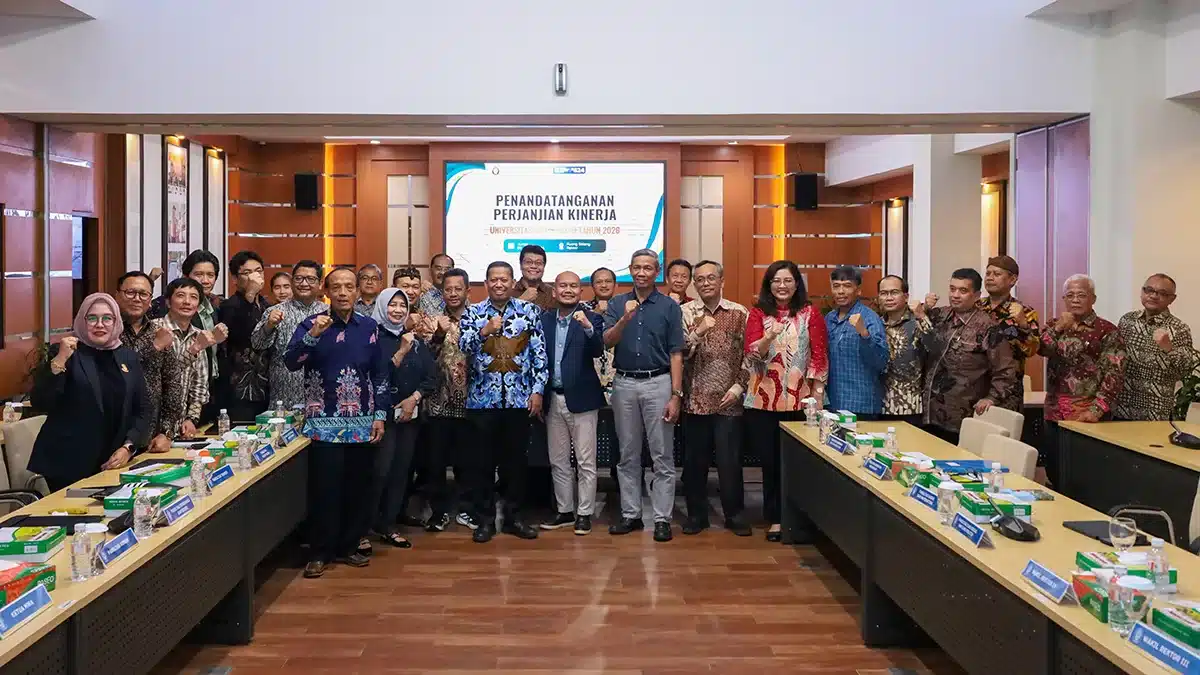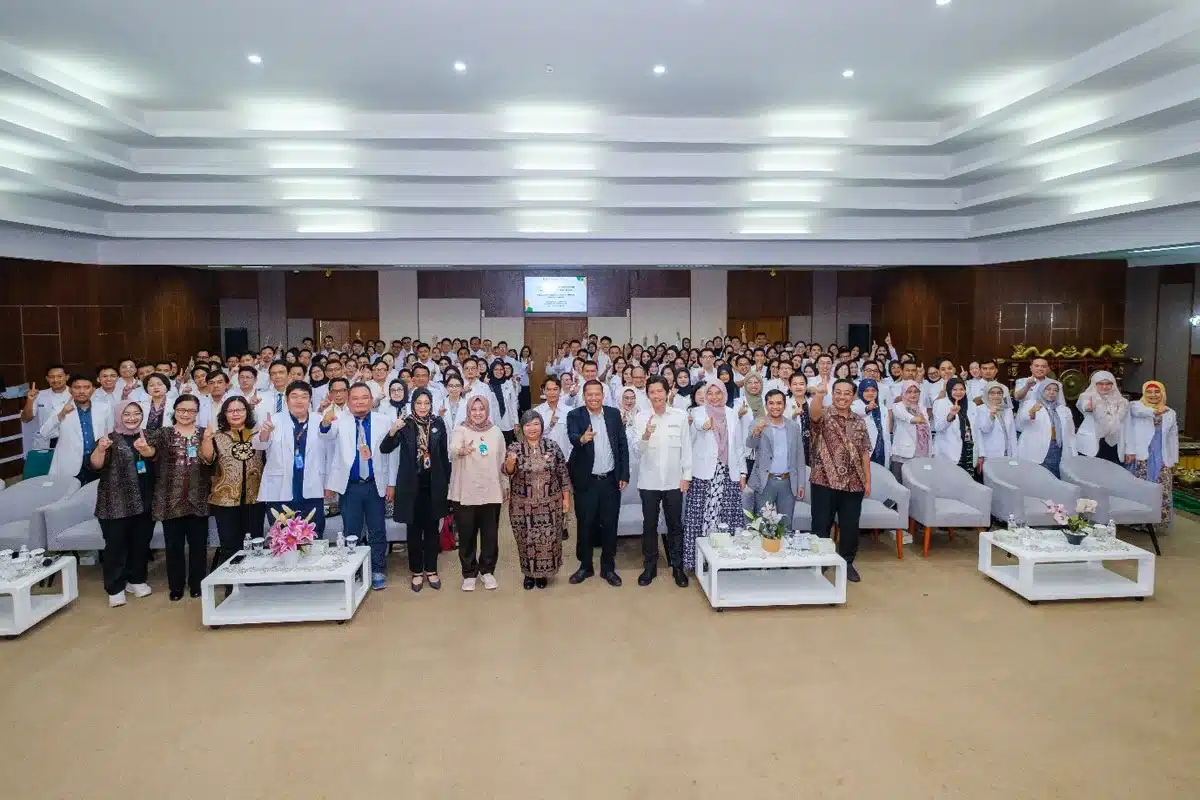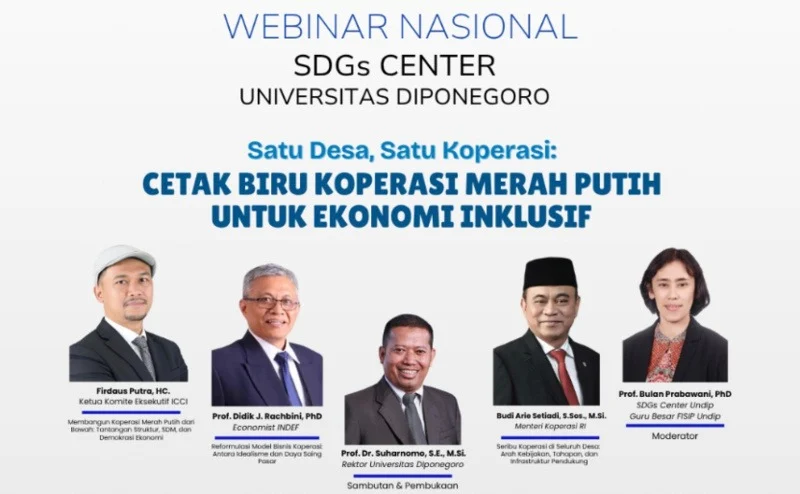UNDIP, Semarang (June 21, 2025) – Universitas Diponegoro, through its SDGs Center, hosted the fifth series of the “UNDIP Sustainability Talks” in a national webinar titled “One Village, One Cooperative: The Blueprint of Koperasi Merah Putih for Inclusive Economy,” held virtually via Zoom meeting on Friday, June 20, 2025. Indonesian Minister of Cooperatives and Small and Medium Enterprises (SMEs), Budi Arie Setiadi, S.Sos., M.Si., delivered the keynote address on the vital role of cooperatives in bolstering Indonesia’s economy.
Moderated by Prof. Bulan Prabawani, S.Sos., M.M., Ph.D., a professor from UNDIP’s Faculty of Social and Political Sciences and Coordinator of the SDGs Center, the event was part of UNDIP’s ongoing sustainability campaign to support the achievement of the United Nations’ Sustainable Development Goals (SDGs), particularly SDG 1 (No Poverty), SDG 8 (Decent Work and Economic Growth), and SDG 11 (Sustainable Cities and Communities), with a focus on strengthening village economies through cooperatives.
The webinar featured several prominent speakers, including Roysepta Abimanyu, Special Advisor to the Minister of Cooperatives and SMEs (on behalf of Deputy Minister for Business Development, Panel Barus); senior economist at INDEF, Prof. Didik J. Rachbini, MSc., Ph.D.; and Executive Committee Chair of the Indonesian Consortium for Cooperatives Innovation (ICCI), Firdaus Putra Aditama, HC.
In his keynote, titled “Koperasi Merah Putih as a Village Economic Resilience Instrument,” Minister Budi Arie outlined how the Koperasi Merah Putih initiative would serve as a backbone for Indonesia’s rural economy. He revealed the government’s ambitious plan to establish up to 80,000 cooperatives nationwide, which will act as local economic epicenters.
“Cooperatives are not merely economic tools—they are social instruments to eliminate middlemen, shorten supply chains, and boost the competitiveness of farmers and fishers,” Minister Budi Arie stated.
He also emphasized the importance of policy support through Presidential Instruction (Inpres) No. 9 of 2025, which serves as the legal foundation for accelerating the national establishment of village cooperatives.
In his opening remarks, UNDIP Rector Prof. Dr. Suharnomo, S.E., M.Si., reaffirmed the university’s strong commitment to advancing the Sustainable Development Goals (SDGs)—both through academic research and real-world community engagement. “UNDIP will continue to translate government policies into grassroots actions through research and community empowerment. We aim to be present not just in discourse but in impactful actions that serve the nation and its people,” he said.
Carrying the tagline “Noble and Valuable UNDIP,” Prof. Suharnomo stressed that all research activities at the university must serve dual purposes: building an international reputation and generating real societal impact. “Research should not be limited to publication alone—it must bring tangible benefits to the people,” he emphasized.
He also expressed gratitude for UNDIP’s recent leap of 101 positions in the 2026 QS World University Rankings, now placing the university at 624th globally. “This achievement reflects the hard work of our academic community. More importantly, we hope this global recognition translates into greater societal contributions,” he added.
UNDIP, he continued, has drawn national attention for its proactive role in addressing tidal flooding in Jawa Tengah’s northern coastal areas. In partnership with the Jawa Tengah Provincial Government, UNDIP will assist in constructing the High Bridge Sea Wall—an innovative and sustainable solution to environmental challenges in coastal zones.
Regarding the webinar theme, Prof. Suharnomo praised the focus on cooperatives as pillars of the national economy. He highlighted the significance of President Prabowo Subianto’s policy on the “One Village, One Cooperative” initiative and the Koperasi Merah Putih program. “We embrace this with enthusiasm and optimism. But we also recognize that this is no small task—it requires cross-sector synergy and collective effort to overcome public skepticism about cooperatives,” he noted.
He hoped that the insights shared by the speakers, especially Minister Budi Arie’s keynote, would provide intellectual nourishment for all participants. “May this event spark more than just discussion—it should generate ideas and real action,” he concluded.
Roysepta Abimanyu, speaking on “The Strategic Role of Koperasi Merah Putih in Advancing a People-Based Economy,” elaborated on concrete steps for cooperative development using pilot mock-ups and cross-ministerial support.
“Koperasi Merah Putih is not a short-term project—it is a long-term social investment. We are promoting models tailored to village needs with strong mentoring support,” he explained.
He also emphasized the need for digitalizing cooperative management and consolidating businesses through secondary cooperatives (Kopdeshub).
Firdaus Putra Aditama, in his presentation “Rationalizing Koperasi Merah Putih: Inverting and Expanding the Vision,” stressed the importance of a bottom-up approach in cooperative development. “If cooperatives are created merely as projects, without genuine member awareness, we are doomed to repeat past failures. Active citizen participation and alignment with local potential are keys to sustainability,” he said.
He added that cooperatives should be built through small wins, not symbolic gestures, to ensure authentic growth rooted in village communities.
INDEF Senior Economist Prof. Didik J. Rachbini highlighted the urgent need to reformulate cooperative business models to adapt to digital transformation and market dynamics. “Cooperatives’ contribution to national GDP remains below 1 percent. This fact underlines the urgency of boosting competitiveness through technology and improved governance,” he said.
Prof. Didik also suggested adopting more flexible, locally grounded strategies to enable cooperatives to make a more significant contribution to domestic economic development.
Wrapping up the event, Prof. Bulan Prabawani, Ph.D., emphasized that cooperative development must be based on multi-stakeholder collaboration involving government, academia, businesses, and local communities.
The webinar was attended by hundreds of participants, including academics, cooperative practitioners, local government officials, and students. The SDGs Center at UNDIP hopes the discussion will inspire inclusive, modern, and sustainable cooperative policies and practices to help realize Golden Indonesia 2045. (UNDIP/Public Communication/DHW; ed. Nurul Hasfi)









